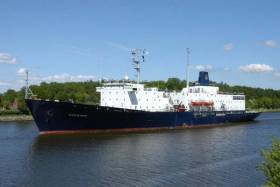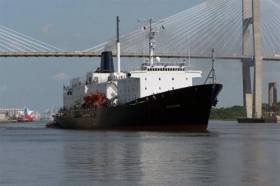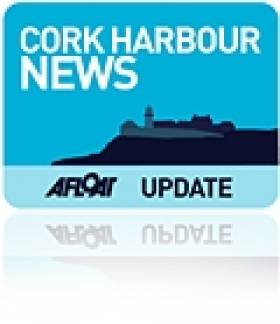Displaying items by tag: US Trainee Schoolship
US Trainee Ship Makes Annual Cruise With Call to Cobh
#corkharbour- Following last year’s 75th anniversary of the Maine Maritime Academy, their flagship trainee schoolship returned to Cork Harbour as part of an annual cruise programme, writes Jehan Ashmore.
The 12,000 gross tonnage TS State of Maine had sailed from Alicante, Spain and is currently berthed at Cobh. The deepwater berth here is otherwise the scene of summertime cruiseships but is to where the trainee ship had previously called last year.
The trainee cruise by the State of Maine this season includes ports on both sides of the Atlantic Ocean. They are (though subject too change) Charleston in South Carolina, Tenerife, Spain, Halifax, Nova Scotia, Portland, ME, Edinburgh, Scotland and New York.
At 152m/500ft long the flagship heads MMA’s fleet of 60 vessels. In the case of this ship she is a converted oceanographic research vessel that served the US Navy having been launched as USNS Tanner from the Bethlehem Steel Corporation in Maryland in 1990. For the next three years she served in the US Military Sealift Command.
Acquired in 1997, the trainee ship is the college flagship of the Marine Transportation programme and the vessel’s homeport is Castine Harbour in Maine.
The vessel was renamed the Training Ship State of Maine, and was modified to increase the accommodation from 108 to 302 persons.
New lifesaving equipment and upgrades to existing equipment were accomplished as well as enhancements to the habitability requirements of the flagship.
The academy was founded in 1941 and enrolls more than 900 students from 35 states and from several foreign countries.
Students in the college are awarded A.S., B.S., and M.S. degrees in 15 fields of study. The schoolship provides an opportunity for midshipmen to get hands on experience afloat.
US Maritime Trainee Schoolship Bids Cobh Farewell
#UStrainingShip - In this 75th anniversary of the Maine Maritime Academy, their flagship trainee schoolship which has been on a visit to Cobh, departed Cork Harbour this morning, writes Jehan Ashmore.
TS State of Maine is one MMA’s fleet of 60 vessels and the 52m/500-foot converted oceanographic research vessel built for the US Navy. Acquired in 1997, the vessel is the college flagship of the Marine Transportation program. The training ship's homeport is Castine Harbour in Maine.
The academy was founded in 1941 and enrolls more than 900 students from 35 states and from several foreign countries. Students in the college are awarded A.S., B.S., and M.S. degrees in 15 fields of study. The schoolship provides an opportunity for midshipmen to get hands on experience afloat.
Commissioned for the US Navy as the USNS Tanner, the vessel was built by Bethlehem Steel Corporation at its Sparrows Point Yard in Maryland in 1990. For the next three years she served in the US Military Sealift Command.
The Irish Continental Group (ICG) in April acquired fastferry, Westpac Express and as previously reported on Afloat.ie last month the craft was onward delivered to Sealift LLC. They in turn chartered the craft to the US MSC.
During the training ship's visit Cobh, was also berthed at the cruise terminal berth the local tug, Alex. Likewise of the schoolship, the tug of 397 gross tonnage has origins with the North American continent having been built in neighbouring Canada in 1995 and based out of Halifax.
US Trainee Schoolship State of Maine Makes Cobh Call
#USschoolship - Cobh which is synonymous with cruiseships is host to a US training schoolship with up to 300 students on board, writes Jehan Ashmore.
The 12,524 tonnes schoolship State of Maine is understood to have departed her homeport of Portland Me on 13 June. She is berthed at the Cobh's Deepwater Quay during an annual Summer Training Cruise for the Maine Maritime Academy.
State of Maine, is the flagship of the Academy and offer trainees a Vessel Operations and Technology (VOT) program that leads to a Bachelor of Science degree. The VOS curriculum is designed to prepare students for positions of responsibility as operators and managers of a variety of private and commercial vessels.
If qualified, students may sit for the U.S. Coast Guard examination for 500-ton or 1600-ton Near-Coastal Mate's License. Those who complete the curriculum can have careers aboard tugs and barges, ferries, passenger vessels, tall ships, and mega-yachts.
Prior to her current role, the 142m State of Maine had begun a career as the US Navy supply ship USS Tanner when launched by the Bethlehem Key Highway yard in Baltimore.
The blue hulled vessel presents a distinctive profile given two large white angular superstructure blocks to accommodate quarters for her trainees.
For those wondering what is the next cruiseship due to berth at Cobh, this will be Azamara Journey on 6 July. The 30,000 tonnes cruiseship with up to 686 passengers is operated by Azamara Cruises.
Also scheduled to visit Cork Harbour that same day is Magellen, as previously reported the new flagship of Cruise & Maritime Voyages which is due to Ringaskiddy.
































































